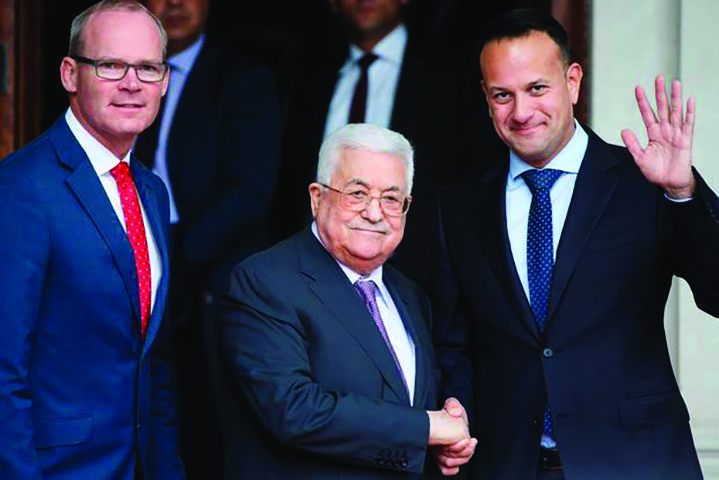
Ireland could be forced to recognise Palestine if dialogue is not achieved according to the Tánaiste and Minister for Foreign Affairs, Simon Coveney.
Coveney made this statement during the Palestine President Mahmoud Abbas’ visit back on September 22.
“Ireland is committed to recognising the state of Palestine but in the context of a negotiated solution,” said Coveney. Currently, Sweden is the only EU member state who recognises Palestine. In total, 137 UN member states recognise it, along with an additional two non-member states.
The chair of the DCU Students for Justice in Palestine society (SJP), Stephanie O’Toole, said there was no good reason to not recognise Palestine.
“By refusing to do so and by refusing to endorse sanctions and boycotts against Israel, Ireland is unfortunately playing an enabling role in allowing Israel to continue its arcane system of apartheid and ongoing genocide,” she said.
Coveney said that Ireland’s decision to increase support for Palestine was due to Israel’s “increased settlement activity” and destruction of Palestinian houses in the West Bank.
The West Bank, East Jerusalem and Gaza are the three areas with the greatest Palestinian population, and as such they could make up an eventual Palestinian state.
However, Israel views the West Bank as a disputed area, and it’s also very unlikely for it to give over control of East Jerusalem.
Coveney criticised Israel for its occupation of the West Bank and said that Ireland is entirely committed to working towards a two-state solution.
However, O’Toole does not believe a two-state solution is feasible, and that it would only be rewarding the increasing expansion of Palestinian land.
“The unfettered fragmentation of Palestinian territory means Israel is quite literally conquering all lands, with construction of more than 650,000 illegal settlement,” she said.
“[The] Israeli elite does not want a two-state solution and they will never cede their occupied territory. They want Palestinians to disappear so that they can fulfil their Zionist colonial project.”
Meanwhile, Coveney also met the Palestinian Foreign Minister Riad Malki and told him that the Irish people are in solidarity with the injustices faced by the Palestinian people.
This support was echoed by O’Toole, who said that so far, SPJ has received an overwhelmingly positive reaction.
“We have had people expressing pro-Palestinian sentiment that are incoming first years as well as mature and PHD students. We have also had staff and faculty members reach out.”
O’Toole believes this is because of the parallels between the current injustices in Palestine and the similar colonial behaviour which occurred in Ireland.
Coveney’s meeting also led to the announcement that there will be an informal summit to bring back the halted Palestinian peace process.
Additionally, the Irish government plans to increase by 50 percent the annual funding given for humanitarian aid to assists Palestinian refugees.
Abbas called on the Irish government to do more for the Palestine plight, and he also wants Europe to come to a joint solution on how to achieve peace in the Middle East.
By Brendan Fernando Kelly Palenque
Image Credit: Mark Condren for the Independant.ie
